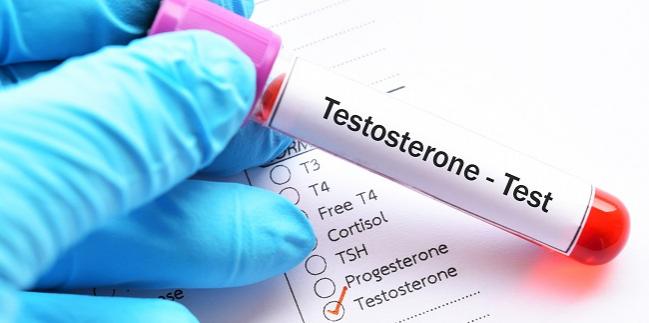Retrospective Study Links Testosterone Therapy to Lower Mortality After MI, but Controversy Continues
This study is unlikely to curb debate over testosterone therapy and CV risk, which outside experts say warrants a dedicated trial.

In the latest in a long line of studies stoking this controversy, a retrospective cohort analysis of US veterans suggests that men with a history of MI may experience some protective benefit from testosterone replacement therapy—via injection, gel, or patch—to normalize their hormone levels.
Specifically, men with normalized testosterone levels had a lower risk of all-cause mortality than men whose testosterone remained low despite having received replacement therapy, as well as men who never tried testosterone therapy at all. On the other hand, the study found no appreciable impact on the risk of MI.
“Our study does not blanketly endorse testosterone therapy,” senior author Rajat S. Barua, MD, PhD (Kansas City VA Medical Center, MO), told TCTMD. “It actually highlights that you have to appropriately screen, select, and dose testosterone therapy.”
Other experts in this space, however, took a dimmer view of the findings, raising concerns about the study methodology and the ability to draw anything in the way of conclusions.
Strenuous Debate
The connection between testosterone replacement therapy and CV events remains up for debate. Direct-to-consumer advertisements often trumpet the therapy for aging men who merely feel tired or lethargic, which is why in 2015 the US Food and Drug Administration asserted that it is only appropriate for men with lab-verified low testosterone levels.
But the agency hedges its bets on CV outcomes: “FDA has concluded that there is a possible increased cardiovascular risk associated with testosterone use. These studies included aging men treated with testosterone. Some studies reported an increased risk of heart attack, stroke, or death associated with testosterone treatment, while others did not.”
Reliance upon retrospective data, based on heterogenous populations and nonstandard definitions of testosterone dosage, may explain the variable results and rigorous clinical trials are lacking. Indeed, Barua along with lead author Olurinde A. Oni, MBBS, MPH (Kansas City VA Medical Center), and colleagues acknowledged this shortcoming: “Our understanding of the cardiovascular effects of testosterone replacement therapy will be further enhanced with adequately powered, prospective clinical trials featuring long-term follow-up.”
Their paper, which appeared online recently ahead of print in the American Journal of Cardiology, is unlikely to settle the controversy about the connection between testosterone therapy and CV outcomes, outside experts cautioned TCTMD.
The Prior MI Subgroup
Barua’s group had previously reported that testosterone therapy reduced risk of MI, stroke, and mortality among veterans without a prior history of MI or stroke. The current study sharpened the focus to veterans who had a history of MI, to gauge if the purported benefits of therapy extended to a higher-risk group.
Using data from 1999-2014, the researchers identified individuals treated in the Veterans Affairs Health System who had experienced a nonfatal MI before learning they had low testosterone. Of 1,470 total patients, 173 did not begin testosterone treatment, 755 patients returned to normal testosterone levels upon treatment, and 542 patients maintained low levels even after treatment.
Units and reference ranges for what constitutes low testosterone vary across assays; to account for this, the researchers categorized tests as low or normal based on the respective normal laboratory reference range reported with each result.
Patients whose testosterone levels returned to normal with therapy had a lower all-cause mortality rate (101 deaths per 1,000 person-years) than those who did not normalize (137 deaths per 1,000 patient years) and those who didn’t receive replacement therapy (163 deaths per 1,000 person years). The risk of death for the normalized group was significantly less than for the non-normalized (HR 0.76; 95% CI 0.64-0.90) and untreated groups (HR 0.76; 95% CI 0.60-0.98).
The incidence of recurrent MI, however, did not differ appreciably among the three groups: 1,391 per 100,000 person-years for the normalized testosterone group, 1,628 per 100,000 person-years for the non-normalized group, and 1,402 per 100,000 person-years for the untreated group (P = NS).
The Caveats
Although at first blush the mortality figures seem promising, Sorin Brener, MD (New York Methodist Hospital, Brooklyn), expressed several reservations to TCTMD. “There is no clinical reason to measure testosterone,” Brener stated, casting doubt on the necessity of the data sources that underpin the study. He also noted that the interval between the MI and the initiation of replacement therapy is unclear, adding that the group of patients who did not receive testosterone (n = 173) is underpowered for drawing any definitive conclusions.
G. Caleb Alexander, MD (Johns Hopkins Bloomberg School of Public Health, Baltimore, MD), also raised methodological concerns. Alexander, the lead author of a 2017 systematic review that found “very low quality” evidence for the connection between exogenous testosterone and MI, stroke, or mortality, told TCTMD that “for every study you find that shows an association [between testosterone therapy and CV outcomes], you can find an equally well-done study that shows no association.”
Alexander, too, expressed reservations about the current report. “The study provides remarkably little information on how many testosterone levels individuals had [tested] and how they were defined as having ‘normalized’ or not,” he pointed out. “What happens if someone is low, then becomes high, then becomes low again a week later? Are they considered normalized or not?” Alexander said he fears that testosterone-therapy providers may use this study and others like it spuriously, to increase sales, despite the paltry and conflicting evidence of benefit.
Unless and until much more definitive evidence emerges, the controversy about testosterone replacement therapy and CV outcomes is likely to persist. In a follow-up email to TCTMD, Barua proposed that the “risks/benefits of testosterone replacement therapy depend on the risk profile of the patient rather than the therapy itself.”
Marcus A. Banks is the 2019 recipient of the Jason Kahn Fellowship in Medical Journalism. He is currently a master’s…
Read Full BioSources
Oni OA, Dehkordi SHH, Jazayeri M-A, et al. Relation of testosterone normalization to mortality and myocardial infarction in men with prior myocardial infarction. Am J Cardiol. 2019;Epub ahead of print.
Disclosures
- Barua, Brener, and Alexander report no relevant conflicts of interest.


Comments